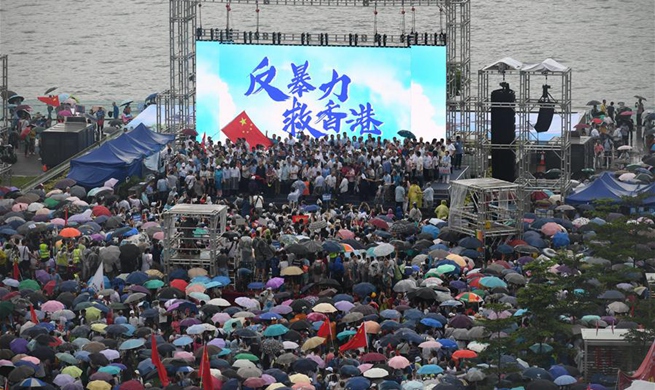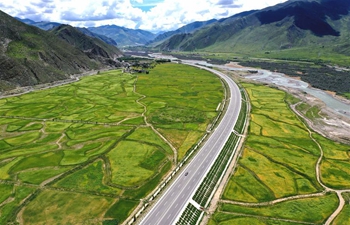ROME, Aug. 19 (Xinhua) -- An argument over the increase in Italy's main sales tax is playing a major role in the fate of the government of Prime Minister Giuseppe Conte and the country's 2020 budget plans.
The value-added tax (VAT) in Italy is 22 percent for most purchases, slightly higher than the average of 20.2 percent for the European Union as a whole. But it is set to automatically increase to 25.2 percent on Jan. 1, 2020, unless Italy can find at least 23 billion euros (25.5 billion U.S. dollars) in new revenue sources to offset the revenue the increased VAT would produce.
Conte's government is teetering on the brink of collapse, with the two parties that support the government - the populist Five-Star Movement and the League, a right-wing nationalist party - saying they can no longer work together. Over their nearly 15-month partnership, the two parties have rarely agreed on policy priorities, but both strongly oppose an increase to the VAT. The main opposition parties are also against increasing the levy.
"Whether or not the VAT should be increased is as close as Italy has to an issue that unites parties across the political spectrum," Alessandro Santoro, a finance science professor at Milan's Bicocca University, told Xinhua. "But if something dramatic does not happen, the increase will happen automatically."
The government crisis may actually make that more likely. Conte is scheduled to address parliament on Tuesday, Aug. 20, ahead of a likely confidence vote. If the vote takes place and if Conte fails to earn a majority vote he will have to step down. With negotiations for Italy's 2020 budget set to start in September, it will be a challenge to find time to hold new elections before the end of the year.
That could mean Italian President Sergio Mattarella will form a technocrat government that would not have the mandate to follow a specific policy line like avoiding the VAT increase.
If new elections are held - some Italian media speculate they could be held in October - then the new government could be thrown into the middle of budget negotiations with little time to cobble together enough new revenue sources to avoid the increase.
If the Conte government defies the odds to survive a confidence vote, analysts said, it would be wounded and less able to build a consensus on how to avoid the higher tax.
"It would take a strong, united government to avoid an increase or to negotiate a delay in the implementation of the tax with the European Commission," Federico Castorina, president of think tank Cultura Democratica, said in an interview. "Whatever happens with the crisis, it is unlikely to produce a strong, united government in the near term."
According to Giuseppe Di Taranto, an economic historian with Rome's LUISS University, the argument over the VAT has such a high profile because it has such an immediate impact on everyone.
"When the VAT goes up, prices of everything rise and not just by the 3.2 percentage points the tax will rise," Di Taranto told Xinhua. "Fuel prices rise and so it costs more to get products to market and then the products cost more when they are sold."
Economists say Italy's massive public debt - the highest in the European Union in absolute terms and the second-highest when stated as a percentage of the country's gross domestic product - acts as a drag on economic growth. But while the revenue from an increase in the VAT would help reduce that debt, Di Taranto said the tax itself would do even more harm given the country's slow-growing economy.
"Increasing the VAT during a recession would be a bad idea," the professor said, adding "Italy's economic growth would recover quicker without increasing the tax burden."













